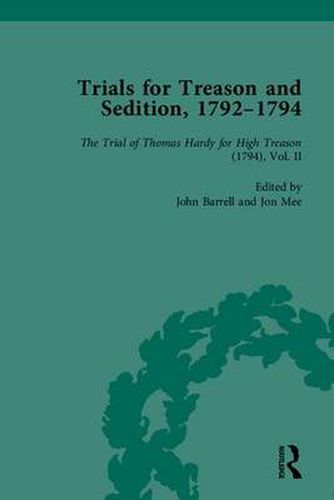Readings Newsletter
Become a Readings Member to make your shopping experience even easier.
Sign in or sign up for free!
You’re not far away from qualifying for FREE standard shipping within Australia
You’ve qualified for FREE standard shipping within Australia
The cart is loading…






The period 1792-4 witnessed the emergence of the first genuinely popular radical movement in Britain . After the phenomenal success of Thomas Paine?s Rights of Man (1791-2), the government moved swiftly to prevent French republican ideas taking hold in Britain , beginning with the prosecution of Paine himself in absentia. There followed a spate of trials for seditious libel, often against booksellers in London who were selling cheap copies of Paine’s book. Finally, in May 1794, the government took the step of accusing the movement of treason, arresting its leaders, among them Thomas Hardy, secretary of the London Corresponding Society, John Horne Tooke, the veteran gentleman radical, and the lecturer and poet John Thelwall. In particular, the movement was accused of conspiring to set up a convention that ? as the government argued ? was aimed at usurping the authority of Parliament. Their acquittal at the end of 1794 was regarded as a triumph for the jury system and gave new hope to the radical movement. These eight volumes contain the key trials of London radicalism from 1792-4. If they represent a governmental attempt to control the flow of ideas, the courtroom also offered a platform for the expression of the defendant?s ideas and often constituted a particular theatre of its own. Trial literature was an established genre that radicals exploited for their own ends and this selection reproduces facsimiles of the original versions put out by the radical press. The set has a general introduction, but each of the trials is carefully introduced in its own right and supported by endnotes and further reading.
$9.00 standard shipping within Australia
FREE standard shipping within Australia for orders over $100.00
Express & International shipping calculated at checkout
The period 1792-4 witnessed the emergence of the first genuinely popular radical movement in Britain . After the phenomenal success of Thomas Paine?s Rights of Man (1791-2), the government moved swiftly to prevent French republican ideas taking hold in Britain , beginning with the prosecution of Paine himself in absentia. There followed a spate of trials for seditious libel, often against booksellers in London who were selling cheap copies of Paine’s book. Finally, in May 1794, the government took the step of accusing the movement of treason, arresting its leaders, among them Thomas Hardy, secretary of the London Corresponding Society, John Horne Tooke, the veteran gentleman radical, and the lecturer and poet John Thelwall. In particular, the movement was accused of conspiring to set up a convention that ? as the government argued ? was aimed at usurping the authority of Parliament. Their acquittal at the end of 1794 was regarded as a triumph for the jury system and gave new hope to the radical movement. These eight volumes contain the key trials of London radicalism from 1792-4. If they represent a governmental attempt to control the flow of ideas, the courtroom also offered a platform for the expression of the defendant?s ideas and often constituted a particular theatre of its own. Trial literature was an established genre that radicals exploited for their own ends and this selection reproduces facsimiles of the original versions put out by the radical press. The set has a general introduction, but each of the trials is carefully introduced in its own right and supported by endnotes and further reading.